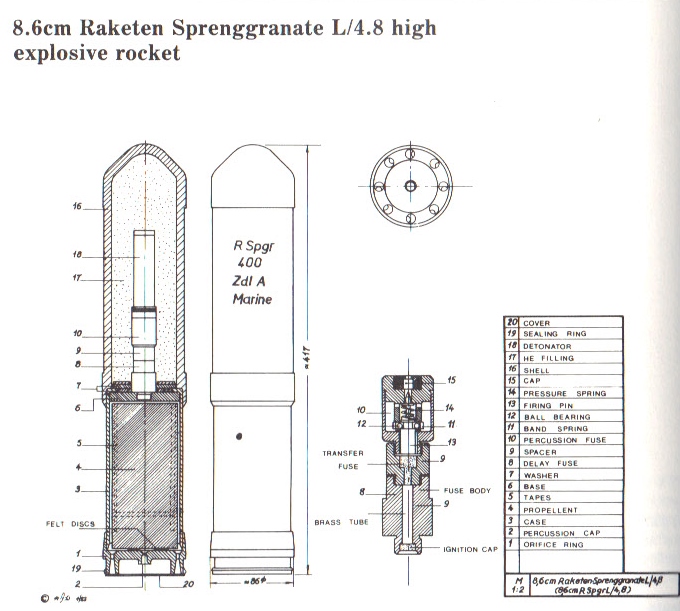This weapon entered service in mid-1944 with patrol craft and was later fitted to larger units. Used a single-barrel projector. Several different kinds of shells were produced, including HE, smoke and wire cable. Each HE rocket had the destructive power of an 8.8 cm AA shell. The wire cable version was similar to the British UP AA rocket and used parachutes connected to 100 m (330 feet) of cable. It is not known if these weapons ever shot down an attacking plane.
The operational technique was to establish three concentric zones around the ship, with each zone given a specific rocket type. These were stored in ready-use lockers close to the launchers.
It is interesting to note that the parachute version of this weapon was similar to the ineffective British UP AA rockets. That weapon was withdrawn from service following the loss of HMS Hood.
| Designation | 8.6 cm (3.4") Raketen Sprenggranate L/4.8 M42/43 |
|---|---|
| Ship Class Used On | Destroyer and Torpedo Boats |
| Date Of Design | 1943 |
| Date In Service | 1944 |
| Gun Weight | 59.5 lbs. (27 kg) |
| Gun Length | 47 in (120 cm) |
| Warhead Weight | N/A |
| Maximum Velocity | N/A |
| Rate Of Fire | 8 - 10 rounds per minute |
| Type | Rocket Projectile |
|---|---|
| Projectile Types and Weights 1 2 | HE 400: approx. 18.5 lbs. (8.4 kg)
HE 600: approx. 18.5 lbs. (8.4 kg) HE 800: approx. 18.5 lbs. (8.4 kg) Parachute & Cable 400: 11.0 lbs. (5.0 kg) Parachute & Cable 1000: 11.7 lbs. (5.3 kg) Starshell 3: 9.5 lbs. (4.3 kg) |
| Bursting Charge | N/A 4 |
| Projectile Length | HE: 18.8 in (47.7 cm)
Parachute & Cable 400: 15.4 in (39.2 cm) Parachute & Cable 1000: 16.8 in (42.6 cm) Starshell: 15.4 in (39.2 cm) |
| Propellant Charge | N/A - Black Powder |
| Muzzle Velocity | N/A |
| Working Pressure | N/A |
| Approximate Barrel Life | N/A |
| Magazine capacity per gun | 28 rockets per launcher 5 |
- ^Other types of rockets for special purposes such as smoke-marking and signaling were proposed or manufactured but the fleet objected to the profusion of types. The ones listed here were the main variants actually carried by warships.
- ^
Actual Projectile designations
Last value indicates nominal range of rocket in metersHE 8.6 cm Speinggrante L/4,8 400 (R.Spg. 400) HE 8.6 cm Speinggrante L/4,8 600 (R.Spg. 600) HE 8.6 cm Speinggrante L/4,8 800 (R.Spg. 800) Parachute & Cable 400 8.6 cm Rkt. Drahtseilgerät 400 (R.Dg. 400) Parachute & Cable 1000 8.6 cm Rkt. Drahtseilgerät 1000 (R.Dg. 1000) Starshell 8.6 cm Rkt. Leuchtgeschoss - ^Starshell burned for 30 seconds.
- ^The warhead of the HE projectile was said to be equivalent to a 8.8 cm HE shell.
- ^As noted above, the operational concept was to establish three concentric zones around the ship. Close to each launcher were ready-use lockers. Each locker contained three rows of five rockets each. Row 1 had R.Dg 1000 for Zone 1; Row 2 had R.Dg. 400 or R. Spg. 800 for Zone 2; Row 3 had R. Spg. 400 for Zone 3. Zone 1 was 3,000 to 4,500 m distant, Zone 2 1,500 to 3,000 m distant, and Zone 3 was less than 1,500 m. It was estimated that with a salvo every 2 to 2.5 seconds that an aircraft traveling 275 mph (120 mps) would receive 5 or 6 shots from each RAG per zone.
| Projectile | Elevation | Distance |
|---|---|---|
| HE Rocket 400, 600 and 800 | 40 degrees | 440, 660 or 870 yards (400, 600 or 800 m) |
| Parachute Rocket 400 and 1000 | 440 or 1,090 yards (400 or 1000 m) |
| Designation | 8.6 cm Raketen, Abschussgerat M42/M43: Single tube launcher |
|---|---|
| Weight | 79.4 lbs. (36 kg) |
| Elevation | 0 / +90 degrees |
| Elevation Rate | Manually operated, only |
| Train | 360 degrees |
| Train Rate | Manually operated, only |
| Gun recoil | N/A |
Destroyers modified per Operation Barbara (increased AA weapons) were to receive up to 6 launchers while Torpedo Boats operating in the Skaggerak received many more.
"Naval Weapons of World War Two" by John Campbell
"German Destroyers of World War Two (2nd Edition)" by M.J. Whitley
17 May 200 - Benchmark
22 May 2012 - Updated to latest template
09 November 2014 - Added projectile information and redid diagram
10 October 2024 - Converted to HTML 5 format

